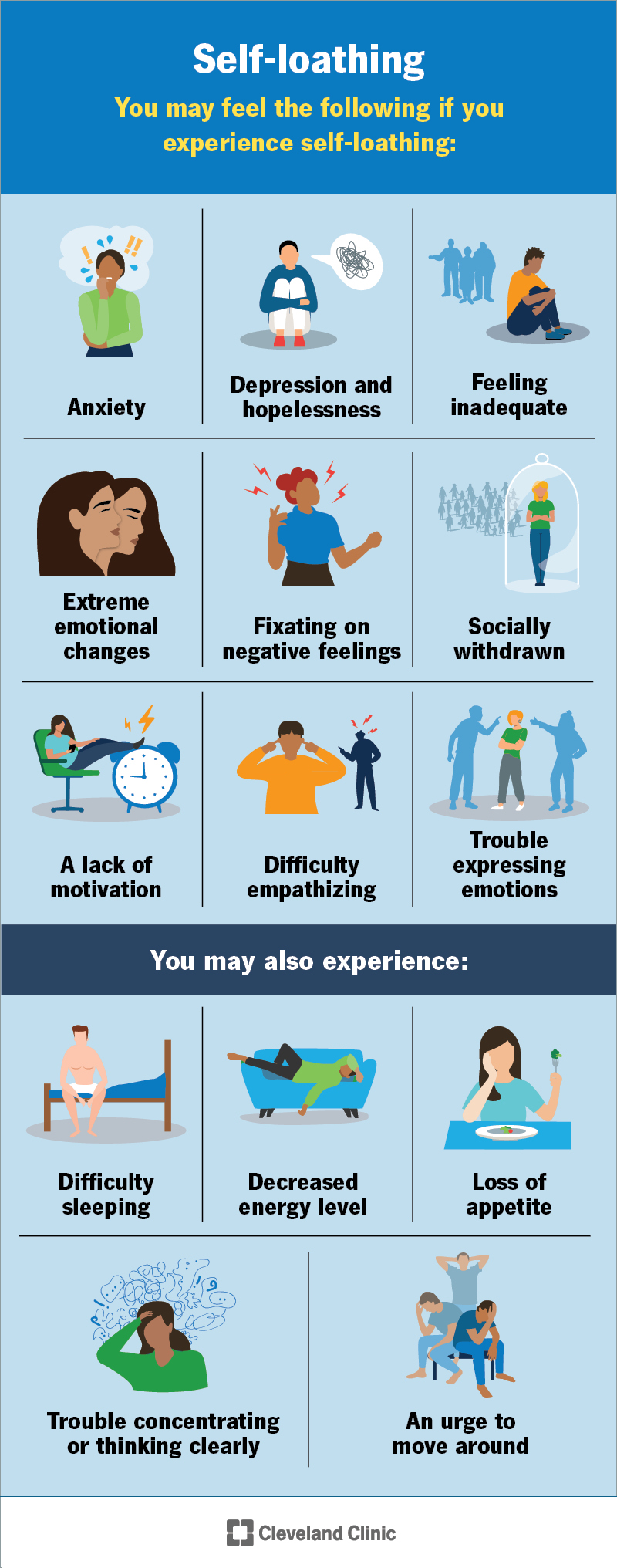Self-loathing is a negative self-view that makes you believe you aren’t good enough. It can affect your relationships, school or work performance and ability to sleep well. Negative thoughts usually make you feel worse, which cycles into more negative thoughts. A mental health professional can help you adjust your thinking so you feel better.
Advertisement
Cleveland Clinic is a non-profit academic medical center. Advertising on our site helps support our mission. We do not endorse non-Cleveland Clinic products or services. Policy

Image content: This image is available to view online.
View image online (https://my.clevelandclinic.org/-/scassets/images/org/health/articles/self-loathing)
Self-loathing is a strong feeling that you’re not good enough. It resembles self-hate.
Advertisement
Cleveland Clinic is a non-profit academic medical center. Advertising on our site helps support our mission. We do not endorse non-Cleveland Clinic products or services. Policy
With self-loathing, you might over-criticize the way you look or the things that you do. You may notice all of your flaws or mistakes and put yourself down because of them. You may feel unworthy, worthless or imperfect.
Self-loathing makes it difficult to see the positives and the good parts of every moment when your mind focuses on the negatives.
Experiencing self-loathing doesn’t mean you’re a bad person or incapable of feeling good about yourself. It just means that your brain is wired to think differently. There are ways that you can rewire your brain. Sometimes, this is challenging to do, so don’t hesitate to reach out to a healthcare provider. They can help you rearrange those wires so you can feel better.
You may feel the following if you experience self-loathing:
Self-loathing may affect your behavior. It could reduce your motivation so you’re less likely to carry out positive behaviors. For example, you may feel like there’s no point in pursuing a promotion at work. Or you might avoid self-care because of negative thoughts.
Advertisement
You may also experience:
Self-loathing may look and feel different for each person who experiences it. The most common features include:
Your thoughts could be overwhelming. Some examples of self-loathing thoughts may include:
Negative thoughts and feelings typically happen in a cycle. As negative thoughts continue, it makes you feel bad. This contributes to more negativity.
No. But self-loathing may be a symptom of many underlying mental health conditions. The most common condition is depression.
There are a lot of factors that may contribute to self-loathing. It typically develops over time. Some examples of what may cause self-loathing may include:
Self-loathing can be challenging to manage on your own. You can talk to a mental health professional who can help you work through these difficult thoughts and feelings. They may recommend participating in cognitive behavioral therapy. This is a type of talk therapy where you’ll learn more about how your thoughts and feelings affect your behavior so you can take steps to address them.
Everyone can benefit from therapy, and it isn’t a sign of weakness or failure. Instead, it’s a sign of strength and wanting to take care of yourself.
It takes time and practice to interrupt the cycle of negative thoughts and feelings. Here are some tips that may help:
One way to deal with self-loathing is to approach the critic. You can imagine self-loathing as a very opinionated critic in your head. They have something not-so-nice to say about everything you do. But have you tried talking to them? You can try the following:
Advertisement
When you talk to the critic, you can practice different ways to talk to yourself to manage negative thoughts. This gives you more insight into how often you may be unfair or unkind to yourself. It opens the door to allow yourself some compassion and empathy.
Having occasional negative self-thoughts is normal. But if these thoughts become overwhelming, distracting or prevent you from completing your routine, it’s time to talk to a healthcare provider.
Here are some examples of when you should get help for self-loathing:
Self-loathing thoughts may lead to other thoughts about suicide or self-harm. If you start to have these thoughts, you’re not alone — and help is available. You can reach out to a healthcare provider or call or text 988. This is the Suicide & Crisis Lifeline. Someone is available to talk to you 24/7. If you’re in immediate danger, contact 911 or your local emergency services number.
Advertisement
It’s common not to like every part of who you are. But if your dislikes outweigh your likes by a long shot, it’s time to talk to someone about them.
Self-loathing can be difficult to manage when you face it alone. But you don’t have to do it on your own. A healthcare provider can help when you’re ready. It’ll be challenging to adjust your pattern of thinking. And the results need time to develop. But many people can turn negative thoughts into positive ones. So, don’t give up hope if you’re managing self-loathing.
Advertisement

Sign up for our Health Essentials emails for expert guidance on nutrition, fitness, sleep, skin care and more.
Learn more about the Health Library and our editorial process.
Cleveland Clinic’s health articles are based on evidence-backed information and review by medical professionals to ensure accuracy, reliability and up-to-date clinical standards.
Cleveland Clinic’s health articles are based on evidence-backed information and review by medical professionals to ensure accuracy, reliability and up-to-date clinical standards.
Your mental well-being is just as important as your physical well-being. Cleveland Clinic’s mental health experts can help you live life to the fullest.
